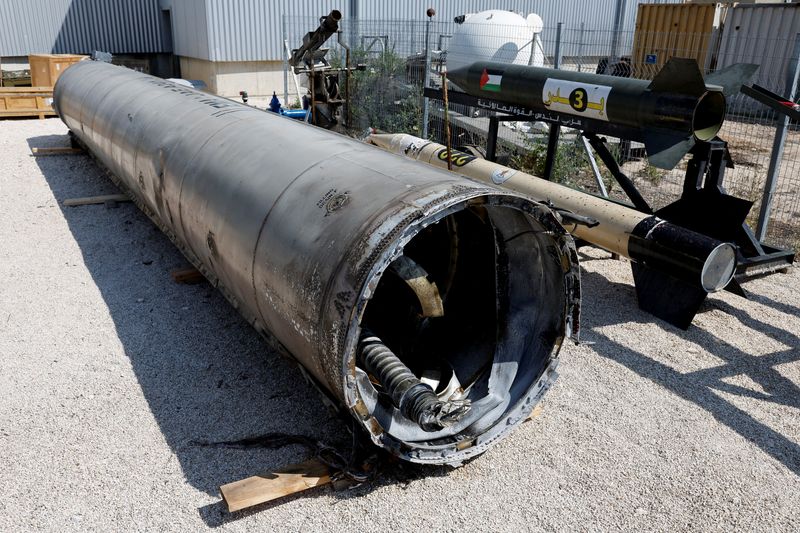By James Mackenzie
JERUSALEM (Reuters) -Israel’s war cabinet was set to meet for the third time in three days on Tuesday, an official said, to decide on a response to Iran’s first-ever direct attack, amid international pressure to avoid further escalating Middle East conflicts.
Military chief of staff Herzi Halevi had promised that Saturday night’s launch of more than 300 missiles, cruise missiles and drones from Iran at Israeli territory “will be met with a response”, but gave no details.
While the attack caused no deaths and little damage, thanks to the air defences and countermeasures of Israel and its allies, it has increased fears that violence rooted in the Gaza war is spreading, with the risk of open war between long-time foes Iran and Israel.
Iran launched the attack in retaliation for an airstrike on its embassy compound in Damascus on April 1 attributed to Israel, but signalled that it did not seek further escalation.
President Joe Biden told Israeli Prime Minister Benjamin Netanyahu at the weekend that the United States, Israel’s main protector, would not participate in an Israeli counter-strike.
Together with European allies, Washington instead strove on Tuesday to toughen economic and political sanctions against Iran in an attempt to dissuade Israel from violent retaliation.
Israeli Foreign Minister Israel Katz said he was “leading a diplomatic attack”, writing to 32 countries to ask them to place sanctions on Iran’s missile programme and follow Washington in proscribing its dominant military force, the Revolutionary Guard Corps, as a terrorist group.
Treasury Secretary Janet Yellen said the U.S. would use sanctions, and work with allies, to keep disrupting Iran’s “malign and destabilizing activity”.
She told a news conference in Washington that all options to disrupt Iran’s “terrorist financing” were on the table, and that she expected further sanctions against Iran to be announced in coming days.
European Union foreign ministers scheduled a video meeting on the Middle East for Tuesday.
Last autumn, Germany campaigned with France and other EU partners to extend the bloc’s existing sanctions regime against Iran that targets drone production.
German Foreign Minister Annalena Baerbock said on Tuesday that several EU members had now promised to look again at extending those sanctions, announcing that she would head to Israel within hours to discuss how to prevent an escalation.
British Prime Minister Rishi Sunak said on Monday the Group of Seven major democracies was working on a package of measures against Iran; Italy, which has the G7 presidency, suggested any new sanctions would target individuals.
IRAN PROMISES RESPONSE ‘IN SECONDS, NOT DAYS’
Iranian Deputy Foreign Minister Ali Bagheri Kani had told state TV on Monday night that Tehran’s response to any Israeli counterattack would come in “a matter of seconds, as Iran will not wait for another 12 days to respond”.
The prospect of Israeli retaliation has alarmed many Iranians already enduring economic pain and tighter social and political controls since major protests in 2022-23.
Since the war in Gaza began in October, clashes have erupted between Israel and Iran-aligned groups based in Lebanon, Syria, Yemen and Iraq.
Israel said four of its soldiers were wounded hundreds of metres inside Lebanese territory overnight, the first known Israeli ground penetration into Lebanon since the Gaza war erupted, although it has regularly traded fire with the heavily armed Lebanese Hezbollah militia.
White House national security spokesman John Kirby (NYSE:) declined on Monday to say whether Biden had urged Netanyahu in talks on Saturday night to exercise restraint in responding to Iran.
“We don’t want to see a war with Iran. We don’t want to see a regional conflict,” Kirby told a briefing, adding that it was for Israel to decide “whether and how they’ll respond”.
Some analysts said the Biden administration is unlikely to seek to sharpen sanctions on Iran’s oil exports due to worries about a big spike in oil prices and angering top buyer China.
In a call between the Chinese and Iranian foreign ministers, China said it believed Iran could “handle the situation well and spare the region further turmoil” while safeguarding its sovereignty and dignity, according to Chinese state media.
Iran’s weekend attack caused modest damage in Israel and wounded a 7-year-old girl. Most missiles and drones were shot down by Israel’s Iron Dome defence system and with help from the U.S., Britain, France and Jordan.
In Gaza itself, where more than 33,000 Palestinians have been killed in the Israeli offensive according to Gaza health ministry figures, Iran’s action drew applause.
Israel began its campaign against Hamas, the Iranian-backed Palestinian militant group that runs Gaza, after Hamas attacked Israel on Oct. 7, killing 1,200 people and taking 253 hostages, by Israeli tallies.
Iran’s attack prompted at least a dozen airlines to cancel or reroute flights, with Europe’s aviation regulator still advising caution in using Israeli and Iranian airspace.
